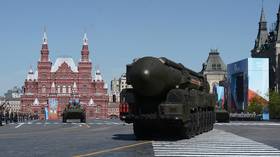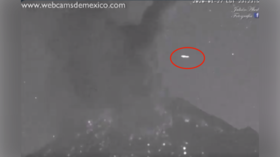New START looks finished: Russia's Lavrov pessimistic about future extension of nuclear arms treaty, calls US demands unacceptable

Russia believes that the New START nuclear arms reduction treaty, due to expire in three months, will not be extended. That’s according to Foreign Minister Sergey Lavrov, who blamed the conditions set by US negotiators.
Speaking at a virtual press conference on Thursday, Lavrov complained that US President Donald Trump’s administration is too concerned about winning and losing, which extends not only to elections, but also to negotiations and deals with foreign countries.
“Conversations are conducted in terms of the mentality of ‘who will win, who will lose,’” Lavrov said. “When talking about the START treaty, everyone can win if we extend it without any preconditions.”
Also on rt.com Putin praises new Russian nuclear forces control site, insists systems should be ‘simple and reliable like a Kalashnikov'The first START treaty was signed in 1991 by then-US President George H.W. Bush and his Soviet counterpart Mikhail Gorbachev, and expired in 2009. This was immediately followed by New START, agreed by Presidents Barack Obama and Dmitry Medvedev. The agreement puts restrictions on the amount of deployed nuclear warheads, but does not limit the number of inactive missiles allowed to be stockpiled. The current treaty is due to expire on February 5 next year, and Washington's demands are proving to be a stumbling block.
In particular, the foreign minister noted that the US wants Russia to completely eliminate the usage of the Poseidon underwater vehicle and the Burevestnik cruise missile, both of which are nuclear-powered. Washington also wants to create control posts at Russian weapon-making facilities.
“We already had the situation when American inspectors were sitting at the gates of our military-industrial complex factories,” Lavrov explained. “This was in the 1990s, and there will never be a return to this system.”
With the ongoing turmoil around the US election, the minister explained that he does not expect to receive any realistic proposals from Washington, and therefore remains pessimistic that the START treaty will be extended.
Also on rt.com ‘In the spirit of goodwill’: Moscow won’t deploy controversial 9M729 missiles in European Russia if NATO reciprocates, says Putin“Considering the hype that has developed in the United States as part of the ongoing vote counting, lawsuits, and other perturbations, it is probably not reasonable to expect any clear proposals from the Americans,” he said. “The ball is now in their court. If the answer is no – well, we will live without the agreement.”
Since Trump took over the US presidency, Washington has been keen to pull out of treaties it deems not to be beneficial. These are not just arms control-related, and range from the North American Free Trade Agreement (NAFTA) to the Paris Agreement on Climate Change.
On October 16, Russian President Vladimir Putin proposed extending the current treaty for a year, without adding any extra conditions.
Think your friends would be interested? Share this story!














